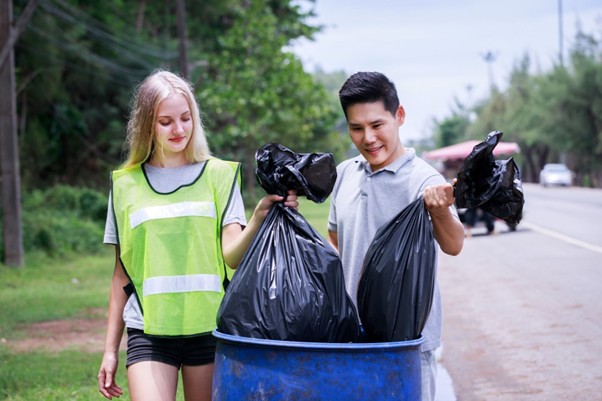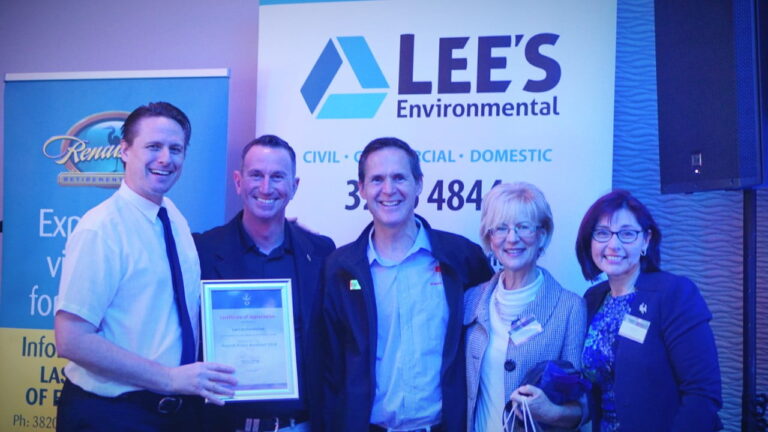Better waste disposal habits can cut the mountains of trash piling up around the globe. When we organise garbage the right way, we slow down the stream of greenhouse gases normally released when rubbish rots or gets burned.
Doing waste management well is not just a slogan; it takes real time and effort. Sorting bottles, counting batteries, and dragging compost bags out in the rain can feel like a second job, especially if no one else in the house pitches in.
Some kinds of waste need a pro touch because they can be dangerous or tricky on their own. Hazardous paints, old car oil, and medical syringes, for instance, must be packed and marked so they do not hurt people or wildlife.
Luckily, simple recycling and waste disposal techniques found with waste management facilities like Lee’s environmental can help with various waste disposal issues.
Prevent Waste through Circular Economy Practices
Aiming to send as little waste as possible to landfills keeps soil healthy and cuts toxic seepage. The less garbage that sits untouched for years, the fewer methane fumes drift up to speed climate change.
If enough locals follow these tips, parks, oceans, and futures will stay cleaner. Kid-table projects become real-life habits, shielding coming generations from grim headlines about rising temperatures and lost habitats.
It’s as simple as better managing garden waste, household waste, food waste, and even office plastic bottles.
First on any green journey is to stop trash from being made at all. Waste prevention sounds easy, yet home habits, clever buys, and community rules must all line up for it to work.
Managing waste is never an easy task, yet it is a hurdle we can no longer ignore.
Reining in the total volume of trash actually begins long before a product ever hits the shelf. If designers and manufacturers find ways to make fewer defective items or cut scraps from the production line, fewer goods will end up in a landfill later.
Pushing this idea further, companies can look to smarter factories that spot waste at every step—from raw material delivery to final assembly—and rethink those stages.
Still, there are smaller moves every office and classroom can make right now. Going paperless trims the mountains of paper arriving each week, and it also slashes the cost of hauling that paper away.
Yes, tossing the printer may sound drastic, but countless businesses have proved it actually lightens the load from day one.
Reduce Waste at its Source
Just like waste prevention, this approach zooms out to tackle the overall tonnage spilling from every sector.
A growing number of retailers are already on board. Many have ditched free plastic shopping bags in favour of sturdy reusable ones.
That tiny swap cuts the need for single-use bags that linger in landfills for centuries, and it also lowers the greenhouse gases produced during bag manufacture.
Business owners and managers really need to spend a few minutes thinking about how much trash their teams create each day. One great way to kick off that thinking is with a simple waste audit.
Try to Reuse Whenever You Can.
A surprising amount of material that ends up in the bin still has life left in it. The goal of smart waste management isn’t to throw everything away, but to stretch each item’s usefulness as long as possible.
Take single-use plastic bags, for example. Instead of tossing them, you might fold a few into your car for grocery trips or use them to keep muddy shoes from staining the carpet. Yard clippings can turn into mulch, old jars can hold screws, and even worn-out pallets can become rustic plant stands.
Think of reuse as a small challenge. Give yourself ten minutes to brainstorm new uses for an item before giving up. You’ll probably surprise yourself—and maybe have a little fun along the way.
That said, not every item can be safely reused at home or in the office. Industrial leftovers, toxic chemicals, medical materials, and other hazardous waste must always be handled by a licensed waste-management firm.
When people stop throwing perfectly good things in the landfill, we all win. Reuse reduces the overall volume of waste and prevents useful materials from rotting silently underground for decades.
Recycling
When most people hear waste disposal, they immediately think recycling. Its success has turned recycling almost into a household term for being eco-friendly.
There really isn’t much new to add about recycling that people haven’t already heard. Countless studies show how recycling programmes help the environment. Almost every town and city in Australia now has its own yellow bin, drop-off centre, or local facility that lets residents choose recycling over dumping straight in the landfill.
Giving a bottle or piece of cardboard a second chance stops it from piling up with all the other rubbish. It also means our regional plants and collection trucks are used in a smarter way.
Using recycled goods in production lowers the overall volume of waste we create. That’s the reason every business, big or small, should take recycling seriously. It cuts a company’s environmental footprint, shows customers and staff that it cares about the planet, and in some cases opens the door to grants or tax breaks from local councils. Plus, seeing a workplace recycle can nudge employees to rethink their home habits too.
Resource Recovery
Resource recovery tries to keep garbage out of the ground by finding new uses for it instead of tossing it in a dump.
Sure, recycling takes a little creativity, but the payoff in money and planet-friendliness makes the effort worth it. In fact, turning trash into treasure opens doors for young inventors with fresh ideas. So, who wants to crack the code on changing old mobile phones into fuel? That simple leap could spark a hot startup—or maybe a fortune.
Electronic throw-aways, known as e-waste, pile up in cupboards and offices faster than people realise. Still, many don’t know those battered gadgets hide valuable metals, plastic, and even organic matter inside.
When innovators pull these materials back into the loop, products get a second life and entire waste systems run smoother. Recycling also proves that value can be found where most eyes see only junk.
Before you start hunting through bins, though, keep human safety at the front of your mind. Slipping on gloves, goggles, and a sturdy mask adds a thin shield that stops most cuts, fumes, or sharp edges from ruining a good idea.
Proper Disposal Is Essential
All the rescue stories are fun, but the truth is, some rubbish really has to end up in a landfill. Items laced with toxic chemicals, leaking batteries, or broken light bulbs still need careful handling.
Just because you toss your rubbish into the bin each day doesn’t mean your input is small. Proper waste disposal is at the heart of every good recycling scheme.
Additionally, waste bins should be used properly to avoid instances like organic waste and aerosol cans ending up in the same bag at recycling facilities.
Putting recyclables and dangerous items in the same bag causes real problems. Waste facilities are set up to handle each stream separately, and mixing them creates extra work.
So take the extra moment to sort batteries, chemicals, and paper before you throw anything away. Little habits like that make the global system run smoother and cheaper.
Stay Curious
The rubbish industry looks mysterious only if you never ask questions. Most waste experts will happily explain how their trucks, bins, and treatment plants actually work.
That friendliness exists because public know-how matters. When people know where to send broken light bulbs or leaking paint cans, they keep those items out of landfills.
You should also chart the waste your office produces. From lunchroom scraps to printer cartridges, knowing the mix helps everyone separate and cut volume.
Computer recycling schemes are one way to curb e waste and other domestic waste.
When we expect every worker to grasp the full flow of rubbish, compliance grows. Seeing the bigger picture encourages smarter sorting and shows why it benefits both wallet and planet.
Promote Waste Management Companies
Using smart and ethical waste disposal methods across Australia’s cities, towns, and outback regions lays the groundwork for a cleaner and greener nation.
And while you’re at it, don’t be shy about asking the corner shop or the local market to step up as well, espcially if they rely on plastic bags or don’t seem to follow a good waste services ideas.
When rubbish is sorted quickly, fewer resources end up in landfill and everyone saves money on collection fees, so waste planning should pop up alongside other management talks.
A small, busy shop or a bustling café might not know how much leftover packaging or spoiled produce it really has, and that’s where a waste audit by a recycling expert comes in handy.
Reduce Food Waste
Even as Australia throws away 7.6 million tonnes of edible food every year, droughts and floods still batter family kitchens everywhere, making the problem painfully real.
Cutting the plate waste means taking honest stock of stock-on-hand, cooking only what guests actually eat, and storing surplus in chillers or freezers before it wilts or goes mouldy.
If you own a café or restaurant with plenty of leftovers, why not box up fresh extras and share them with the local food bank or the church group feeding the homeless down the street?
Make Efficiency Your Own
At the end of the day, the best way to deal with trash is the way that actually fits your life. Too often, people dump everything at the local landfill simply because it requires no extra effort, not because it is the smartest choice.
Even if a municipal service follows standard guidelines, that same system may not work the same way in every neighbourhood, school, or small business.
Take a moment to watch how much waste your household or team generates and play around with sorting, reusing, or composting until you land on a setup that feels natural.
Closing thoughts
Knowing and sticking to good waste-disposal habits is a big part of managing waste in any space. If each kitchen, office, and workshop starts thinking about its leftover food, paper, and plastic, we move one step closer to a cleaner planet.
Don’t shy away from trial and error; testing bins, schedules, and collection companies will teach you what really cuts down the rubbish.
Of course, shortcuts do exist, and that’s where Lee’s Environmental steps in. Their staff can haul away samples, check labels, and run a waste audit so you spend less time guessing and more time acting on what works and what doesn’t.









